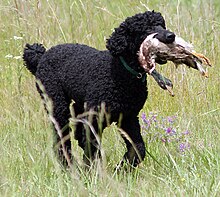Puwo
The Puwo or Poodle Wolf is an experimental Poodle wolf hybrid and thus the result of intraspecific crossing .
The name is made up of the first two letters of the respective parents house dog (king) Pu del (father) and Wo lf (mother). Here, let Poodle and Wolf each other easily used and it came to mating, when the choice of partners was entirely optional (if more wolves and poodles living together). The reverse mating Wopus was successfully several times, and this was difficult because wolf dogs are not permanently ready to mate and females, therefore the time of the wolf brunst provisionally had to be.
Puwos and Wopus became known in the 1960s through Erik Zimen , who used them to study the evolution of the behavior of wolves and domestic dogs. Particular interest was given to the F1 generation and the F2 generation, which resulted from the mating of Puwos with each other.
Puwos are not bred outside of academic research and are therefore usually not kept as pets. Erik Zimen reported that none of the copies that were given to private individuals had caused problems.
More canid crosses
Also in the course of the investigations at the Kiel Institute for Pet Studies, not only intra-species matings of dogs were made, such as those of wolves and domestic dogs, but also closely related dogs (canids) were crossed. Coyotes and domestic dogs; wild offspring are called Coy Dogs , those in Kiel, where poodles were the partners, were called Puko or Kopu . Crossbreeds between golden jackalins and poodle male were called Puscha .
literature
- Erik Zimen: The dog - ancestry, behavior, man and dog. Goldmann, 1992 (paperback edition), ISBN 3-442-12397-6 .
- Dorit Feddersen-Petersen : Dog Psychology. Social behavior and nature. Emotions and individuality. 4th edition. Franckh-Kosmos, Stuttgart 2004, ISBN 978-3-440-09780-9 .
Remarks
- ↑ Dorit Feddersen-Petersen uses the terms N1 / N2 in dog psychology (see under literature ). She writes: "In the following, the speech will be held branch of progeny generation (instead of F1 and F2 are N1 and N2 are the first and the second generation feature) because, in contrast to homozygous starting material of Mendel experiments the mongrel canines barely" homozygous "are in the investigated characteristics and their Erbgängen usually a highly polygenic control is based." (p 54). Zimen uses the terms F1 / F2 in Der Hund .

